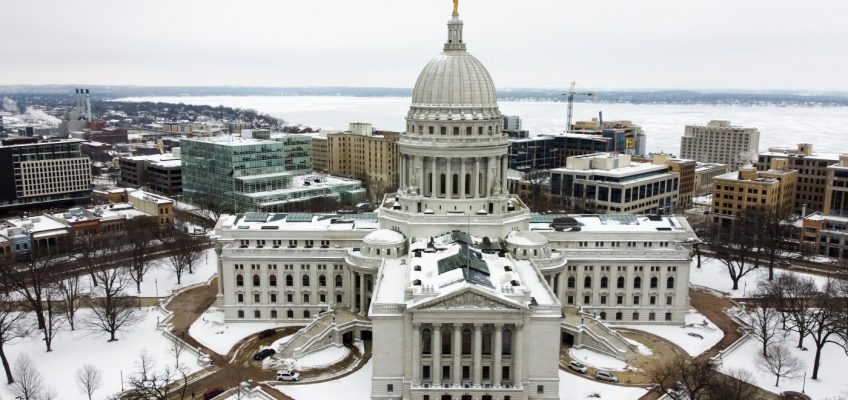Wisconsin’s presidential primary Tuesday clears the way for a general election campaign that Democrats see as an opportunity unlike any in recent state history.
New legislative districts adopted last month erase Republican advantages that gave the GOP dominance of the Wisconsin Assembly even as Democrats won 14 of the past 17 statewide elections. Democrats think they can now compete for a majority, but also that invigorated legislative campaigns can help turn out votes for President Joe Biden and Vice President Kamala Harris in November.
Ben Wikler, the state Democratic Party chairman, describes the idea as “reverse coattails,” a play on the traditional idea that down-ballot candidates are carried by the top of the ticket.
“It drives up turnout among people who had been unlikely to vote in a way that can directly affect the number of votes we get for Biden-Harris,” he said. “It’s why, I think, there are consequences far beyond the state Legislature of having the new state legislative maps drawn.”
It’s too early to test Wikler’s idea. But both parties believe the fall rematch between Biden and former Republican President Donald Trump will be fought at the margins in several of the most contested states, including Wisconsin, which flipped narrowly from Trump to Biden four years ago.
The Assembly speaker, Republican Robin Vos, whose job it is to recruit and elect GOP candidates to maintain the party’s majority in the Statehouse, rejected the Democratic premise.
“Absolutely not,” said Vos, the state’s longest-serving speaker. “Everybody who goes to vote is going to be voting on the presidential race because that’s where all the oxygen is going to be.”
The Democrats argue there will be renewed personal attention to neighborhoods in small towns, suburbs and rural areas that had been part of GOP-heavy legislative seats but are now in more competitive districts. Those districts were seen as not worth the effort before, when Democrats’ only hope was to stave off veto-proof GOP majorities. Now, they will get more campaign staff and volunteers to drive turnout.
Wisconsin is also among a half-dozen battleground states where Democrats are defending Senate seats in hopes of protecting their 51-49 majority. Sen. Tammy Baldwin, running for a third term, is likely to face millionaire businessman Eric Hovde who faces only nominal Republican opposition in the Aug. 13 primary.
Baldwin agrees that she could benefit from “reverse coattails” of legislative races. Previous districts “were so gerrymandered, which meant that there were whole swaths of Wisconsin where there weren’t competitive races,” she said.
“I think this is going to be a very interesting year because I think we’re going to have many more contested races and fair districts mean people’s voices and votes will be heard,” she said during a recent stop in southern Wisconsin.
Take Weston, in northern Wisconsin’s sprawling Marathon County. Until last month, the tract of homes and lakes had been cut into an overwhelmingly rural, Republican-performing Assembly district, detached from the Democratic-performing city of Wausau just 7 miles northeast.
The village of about 14,000 is now expected to attract more campaign activity as part of the new 85th Assembly District, said the county’s Democratic Party chairman, Bill Conway.
“We’re going to have boots on the ground, looking for progressive-minded voters who have been inactive,” Conway said. “And anyone that I turn out to vote for the Assembly race is also going to vote for Joe Biden.”
Of the Assembly’s 99 seats, about half remain reasonably safe bets for Republicans. Democrats, who now hold 35 seats, have a better shot in 15 new districts. Some of those districts are on the outskirts of the Minnesota Twin Cities metro area in northwest Wisconsin and around Eau Claire to the northeast, both Democratic-leaning areas. Others are in the vote-rich Fox River Valley, including around Green Bay, where Trump plans to headline a rally on Tuesday.
Even if Democrats fall short of the Assembly majority, Wikler figures that more aggressive canvassing for legislative candidates could identify people willing to vote Democratic in top-of-the-ticket races that have been tight in recent years.
Four of the past six presidential elections in Wisconsin, including in 2016 and 2020, were decided by fewer than 30,000 votes. In 2018, Democrat Tony Evers edged GOP incumbent Scott Walker for governor in 2018 by 29,227 votes. In 2022, Democrat Mandela Barnes fell 26,255 votes short of defeating Republican Sen. Ron Johnson.
“We’ve got this multiplicity of races going on so the number of people trying to organize here will be higher than almost anyone anywhere in America,” Wikler said. “Their votes could tip the House majority, one of the most competitive Senate races in the country and be the tipping point in the presidential election.”
Vos has said Republicans can win under the new alignment, arguing they had better candidates and a better message.
He agreed that increased face-to-face campaigning could help Statehouse candidates, certainly more than ads on television. But in the end, Vos expects voters to turn up to the polls due to the top of the ticket, not the bottom.
“Their base is going to be motivated by hatred of Donald Trump,” Vos said. “Their base is not going to be motivated because you have two candidates running for the Legislature in Stoughton.”
Related Articles
Apple River stabbing trial begins with photos of confrontation that left Stillwater teen fatally wounded
Was the Apple River stabbing murder or self-defense? Trial begins Monday.
Gov. Evers vetoes $3 billion Republican tax cut, wolf hunting plan, DEI loyalty ban
New viruses, including coronavirus, found in Wisconsin fish
Hudson’s new city administrator comes with Wisconsin local government experience


Leave a Reply